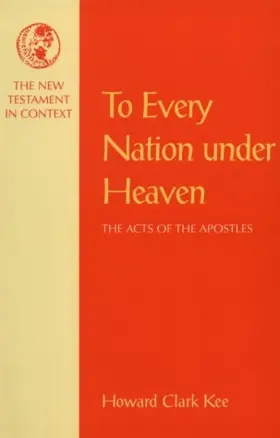

To Every Nation Under Heaven: The Acts of the Apostles (New Testament in Context)
Pages
361
Publisher
Trinity Press International
Published
12/1/1997
ISBN-13
9781563382215
To understand the books of the New Testament, it is essential that the reader be made aware of the social, cultural, and historical contexts in which each of them was produced. This commentary does just that for the Acts of the Apostles, seeking to sensitize the reader to what is written in the text, as well as the assumptions that lie behind it .
Reviews
Harrisburg, PA: Trinity Press International, 1997. Pp. vi + 361, Paperback, $24.00, ISBN 1563382210. Ben Witherington, III Asbury Theological Seminary Lexington, KY 40514 The New Testament in Context commentary series edited by H. C. Kee and J. A. Overman now has a sufficient track record, with more than a half dozen volumes out, to begin to assess its strengths and weaknesses. Does it really provide the target audience (pastors, teachers, seminary students, college religion majors) with fresh data on how to read the books of the NT in their proper social contexts? Put in this broad way, the answer to this question must be yes, though naturally any commentary series is uneven in quality. Clearly the most substantial volume yet to appear in this series is the one under review here. This commentary is arranged much like other volumes in this series with the work divided up into major segments (Kee finds six major sections in Acts-1:1-26; 2:1-5:42; 6:l-8:40; 9:l-15:41; 16.l-20:38; 21:1- 28:31) and in each of these we find a fresh translation and a discussion of some of the major issues in the text in a narrative rather than verse-by-verse commentary format, interspersed with frequent excursuses. In some cases it is not clear what the real rationale for the section divisions is, particularly at 16:1, since it does not follow either narratological or rhetorical features in the text, and since the division between Europe and Asia is not a valid one for antiquity. The author is aware of rhetorical analyses of Acts, particularly the speeches (he cites the work of M. Soards), but he seldom comments on such matters and they do not influence the way he structures his commentary.
[Full Review]
